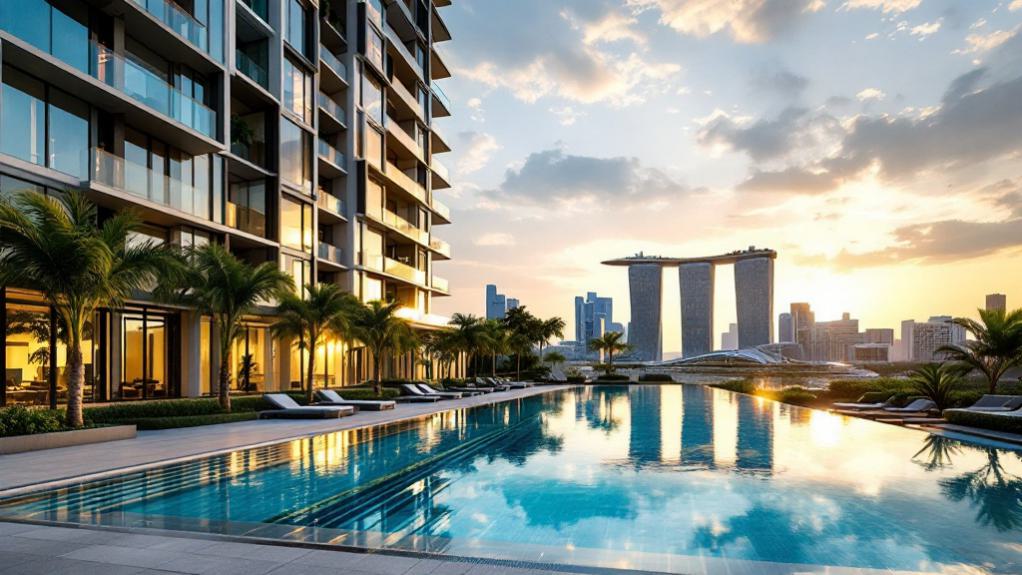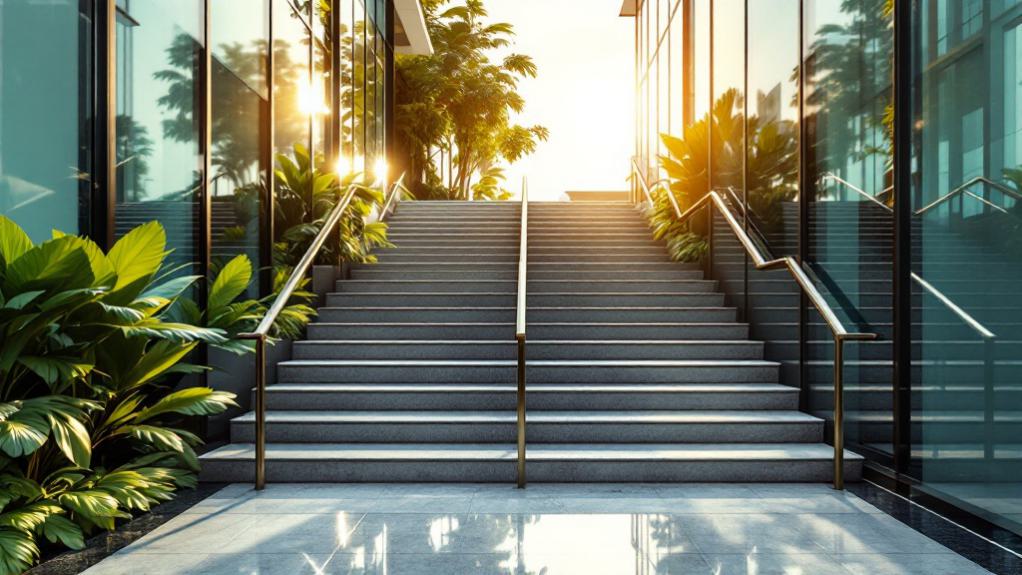Purchasing private property in Singapore involves obtaining financial pre-approval, paying a minimum 25% down payment, and managing a structured transaction process. Buyers must submit an offer with a 1% option fee, exercise the option within three weeks with an additional 4% payment, and settle stamp duties within 14 days. Legal representation is essential for conveyancing, requisitions, and documentation. Post-acquisition obligations include property taxes ranging from 4-32% of Annual Value and ongoing management considerations. Further exploration reveals valuable refinancing strategies and investment optimization techniques.

While Singapore’s property market ranks among the most expensive globally, acquiring private residential property in the city-state remains an attractive investment option for both locals and foreigners due to the country’s political stability, robust legal framework, and strong economic fundamentals.
Singapore’s property market offers compelling investment value despite premium pricing, bolstered by unparalleled stability and economic strength.
The process begins with obtaining in-principle approval from financial institutions to determine budget constraints, which is essential given the minimum 25% down payment requirement—comprised of 5% in cash and 20% through cash or Central Provident Fund savings—and a maximum loan-to-value ratio of 75% for first-time housing loans.
Eligibility criteria vary based on residency status, with Singapore citizens enjoying unrestricted access to all private property types. Permanent residents may purchase non-landed private properties without special approval, while foreigners are generally limited to condominiums and apartments. The acquisition of landed properties by non-citizens requires specific approval from the Singapore Land Authority, and executive condominiums feature additional eligibility restrictions during their first decade. Investors should consider properties in the Core Central Region for potential higher rental yields and capital appreciation.
The transaction sequence typically involves engaging a property agent, submitting an offer with a 1% option fee, and exercising the option within three weeks by paying an additional 4% of the purchase price. Concurrent with these steps, buyers must engage legal representation to handle conveyancing processes, including legal requisitions, title searches, and the preparation of the Sale and Purchase Agreement.
Stamp duties, which include the Buyer’s Stamp Duty of 3-4% and Additional Buyer’s Stamp Duty ranging from 0-30% depending on buyer profile, must be paid within 14 days of exercising the option.
Post-acquisition financial considerations include quarterly property tax payments ranging from 4-32% of the property’s Annual Value, setting aside funds for maintenance, obtaining appropriate insurance coverage, and potential rental income subject to taxation at progressive resident rates. For optimal property assessment, buyers should schedule viewings during busy times to better evaluate the living conditions and neighborhood dynamics.
Property owners typically review refinancing options after their initial lock-in period expires, balancing ongoing mortgage obligations with market conditions to optimize their investment’s financial performance. Buyers can potentially save up to S$3,300 in cash rewards and access exclusive unpublished interest rates by consulting with mortgage specialists.
Frequently Asked Questions
Can Foreigners Purchase Private Property in Singapore?
Foreigners can purchase private property in Singapore, including condominiums, apartments, strata-landed houses in approved condominium developments, and commercial properties without restrictions.
However, they face significant limitations regarding landed properties, requiring Singapore Land Authority approval, except in Sentosa Cove.
Foreign buyers must also contend with a substantial 60% Additional Buyer’s Stamp Duty on residential property acquisitions, alongside standard financing requirements including a minimum 25% down payment.
What Taxes Apply When Buying Singapore Private Property?
When purchasing private property in Singapore, buyers are subject to Buyer’s Stamp Duty (BSD) at progressive rates from 1-4% based on purchase price.
Additionally, Additional Buyer’s Stamp Duty (ABSD) applies, with rates varying considerably by residency status—Singapore citizens pay 0-30%, permanent residents 5-35%, and foreigners a substantial 60% flat rate.
Property tax becomes applicable upon ownership, while Seller’s Stamp Duty may affect future disposition if sold within three years of acquisition.
How Do Bank Loan Approval Timelines Affect Property Transactions?
Bank loan approval timelines greatly impact property transactions, as delays can jeopardize Option to Purchase periods, typically limited to 14 days, potentially resulting in deposit forfeiture.
Pre-approved loans strengthen buyer negotiating positions, while extended approval processes may necessitate OTP extensions, contingent on seller agreement.
The standard timeline—from initial application to disbursement—spans 6-8 weeks, though expedited processing remains possible for urgent cases, depending on documentation completeness, borrower creditworthiness, and property valuation requirements.
What Happens if a Developer Goes Bankrupt?
When a developer declares bankruptcy, Singapore’s Housing Developers (Control and Licensing) Act provides safeguards for buyers.
Project accounts, which hold purchasers’ payments, remain protected with restricted withdrawals. The Building and Construction Authority may intervene to complete unfinished developments, while buyers can form committees to oversee construction completion.
Sale and Purchase Agreements typically remain enforceable, though buyers with Options to Purchase may face complications.
Court-appointed receivers manage the developer’s assets and obligations during insolvency proceedings.
Are There Restrictions on Renting Out My Private Property?
Singapore maintains strict regulations for private property rentals, including a minimum three-month rental period with short-term accommodations prohibited.
Occupancy is limited to six unrelated persons per unit, though temporary provisions allow up to eight occupants in units exceeding 90 square meters until December 2026, subject to registration.
Owners must preserve the approved internal layout, refrain from converting properties to commercial establishments, and guarantee tenants do not create disturbances for neighboring residents.





